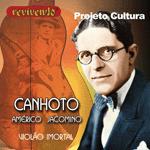 Américo Jacomino 'Canhoto' (12/02 1889 - 7/9 1928) is considered one of the originators of the Brazilian guitar tradition, also of major importance regarding the founding of the guitar choro. His composition 'Abismo de Rosas', a valsa-choro, has been the piece-de-resistance of many a pretending player of the violão (6 string guitar) showing off his or hers skills and knowledge on the guitar choro tradition. As a result of this 'Abismo de Rosas' has also been recorded by numerous Brazilian guitarists, i.e. Dilermando Reis and Garoto just to name a couple of the most famous. Américo Jacomino 'Canhoto' also recorded the piece himself in the early days of record production in Brazil, and finally all of his recorded works now has been released on a double-cd by the Revivendo label, specializing in issueing historical as well as contemporary recordings of Brazil choro.
Américo Jacomino 'Canhoto' (12/02 1889 - 7/9 1928) is considered one of the originators of the Brazilian guitar tradition, also of major importance regarding the founding of the guitar choro. His composition 'Abismo de Rosas', a valsa-choro, has been the piece-de-resistance of many a pretending player of the violão (6 string guitar) showing off his or hers skills and knowledge on the guitar choro tradition. As a result of this 'Abismo de Rosas' has also been recorded by numerous Brazilian guitarists, i.e. Dilermando Reis and Garoto just to name a couple of the most famous. Américo Jacomino 'Canhoto' also recorded the piece himself in the early days of record production in Brazil, and finally all of his recorded works now has been released on a double-cd by the Revivendo label, specializing in issueing historical as well as contemporary recordings of Brazil choro.Alvaro Neder writes about Américo Jacomino 'Canhoto' in AMG: "Canhoto learned to play the guitar with his older brother. As a left-hander, Canhoto never changed the order of the strings, playing the violão (guitar) in the inverted position, which granted his lifelong nickname (which means "left-handed man"). In 1907, he met the famous singer Paraguaçu and started to accompany him in performances during silent movies. In 1913, Canhoto was already enjoying good fame and recorded for the first time for the label Odeon. Three years later, one of his two earliest pieces was "Acordes do Violão," later known as "Abismo de Rosas," one of the classic pieces of the instrumental repertory of the Brazilian violão. With the soon-to-be lyrical singer Abigail Alessio and the actor Viterbo Azevedo, he formed a trio which toured through several cities but was dissolved with Azebedo's murder. Canhoto's production of music for the carnival also had expression; he successfully launched "Ai, Balbina" (with Arlindo Leal, 1920) and "Já Se Acabô" (also with Leal, 1921). Canhoto recorded his other instrumental classic for the guitar, "Marcha dos Marinheiros," in 1926. Francisco Alves re-recorded his samba "Só na Bahia É Que Tem." Voted the King of the Barzilian Violão in a contest in Rio de Janeiro, he returned to São Paulo and formed the Turunas Paulistas group. Canhoto continued to record and perform until his demise."
The shown double-cd has just been released in Brazil and may be ordered online at Revivendo. Click here or on picture to order online.
Jo